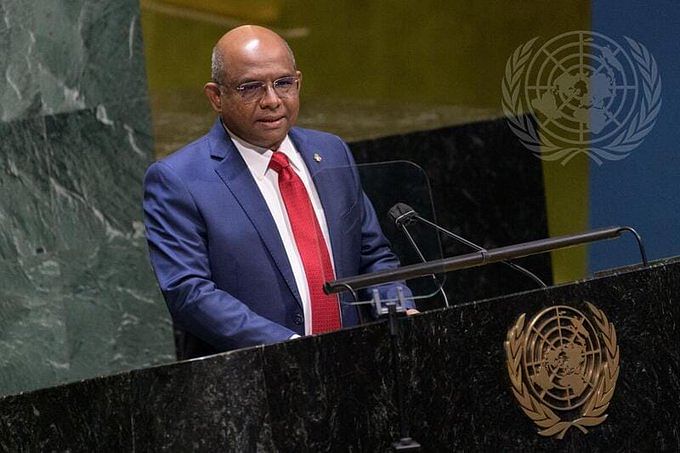Health
Battle to end HIV, COVID, demands greater international solidarity – UNGA President

The President of UN General Assembly, Abdulla Shahid, has called for greater international solidarity to end the scourge of HIV/AIDS.
Shahid told a commemorative meeting on Tuesday marking World AIDS Day – 40 years after the first cases were reported that early years of the HIV/AIDS were plagued by confusion.
He said early years of the HIV/AIDS epidemic were “plagued by confusion, fear, isolation, and discrimination” against those infected or at high risk.
Under the theme “End Inequalities. End AIDS. End Pandemics”, Shahid underscored a connection between COVID-19 and HIV/AIDS.
He pointed out that both exacerbate inequalities and impact people, “particularly in terms of access to treatment and health services”.
Moreover, COVID epidemic and the HIV not only impact the health of individuals, but together have also “impacted households, communities, and the development and economic growth of nations.
“We must reinforce international cooperation and solidarity in the fight against HIV, against COVID-19, and on any public health issue that protects our people,” he said.
Two decades since the landmark General Assembly Special Session on HIV/AIDS, the first ever on a health issue, HIV/AIDS has become a preventable and treatable disease.
The Assembly President attested to the importance of learning from mistakes made then, such as hiding diagnoses due to social stigma, misinformation on prevention or treatment, and policymakers who delayed action.
“This meeting is an opportunity to discuss how the experience of fighting against HIV/AIDS can inform and guide effective, human rights sensitive, and people-centered responses to infectious diseases, such as COVID-19.
“We have a responsibility to act.
“I call on all stakeholders to protect the human rights of all and ensure access to health services without stigma and discrimination,” Shahid said.
While human ingenuity has delivered effective vaccines for COVID-19 in record time, the Assembly President highlighted that as more variants arise, the world must move quickly to “close the gap in access and ensure vaccine equity”.
“I am convening a High-level Meeting on Universal access to vaccines on January 13, 2022, as an opportunity to commit to tackle inequalities and ensure equal and fair access to treatment for all, without discrimination,” he said.
According to him, as misinformation has once plagued HIV/AIDS, today it threatens progress in combatting COVID-19.
“We must resort to all available communication tools to better address health and social issues with a human rights perspective,” Sahid said.
This year is also the 25th anniversary of the Joint UN Programme on HIV/AIDS (UNAIDS) by the Economic and Social Council (ECOSOC), which united entities across the UN system to mobilise countries and communities globally to take action in combatting HIV/AIDS.
“For four decades the programme has provided global leadership, promoted policy consensus, strengthened the capacity of national governments to develop comprehensive national HIV/AIDS strategies and of the UN system to monitor implementation,” ECOSOC President Collen Kelapile said.
“UNAIDS has been instrumental in mobilising political commitment and social action to prevent and respond to HIV/AIDS”.
He said the fight against HIV/AIDS serves as a successful example of political leadership and commitment, joint action in the face of a global crises, and the importance of effective multilateralism.
UNAIDS chief Winnie Byanyima issued a “stark warning” in her virtual message that AIDS remained a pandemic, saying “the red light is flashing and only by moving fast to end the inequalities that drive the pandemic can we overcome it”.
“Without the inequality-fighting approach we need to end AIDS, the world would also struggle to end the COVID-19 pandemic and would remain unprepared for the pandemics of the future”, she warned, which she added “would be profoundly dangerous for us all”.
Byanyima noted that amidst the raging COVID-19 crisis, progress in combatting AIDS is under even greater strain – disrupting HIV prevention and treatment services, schooling, violence prevention programmes and more.
“On our current trajectory, we are not bending the curve fast enough and risk an AIDS pandemic lasting decades”, she cautioned, urging more momentum on member states-agreed concrete actions to address the inequalities that are driving HIV.




 Davido's Net Worth & Lifestyle
Davido's Net Worth & Lifestyle 
